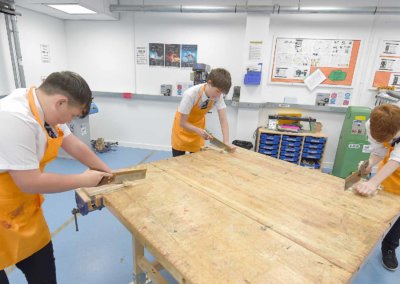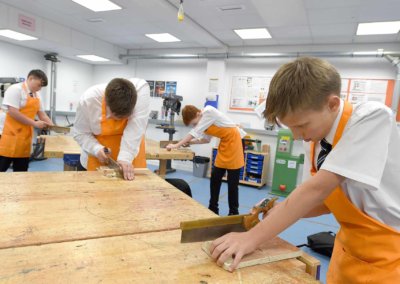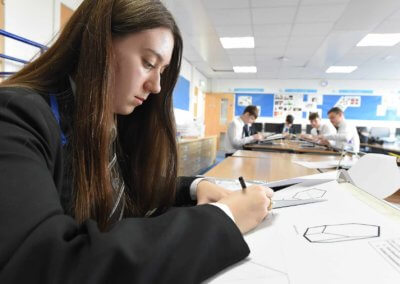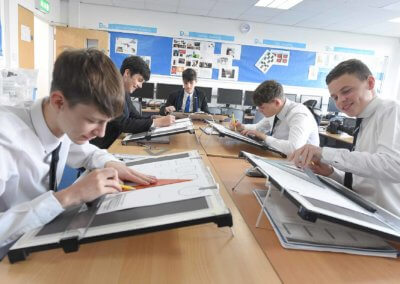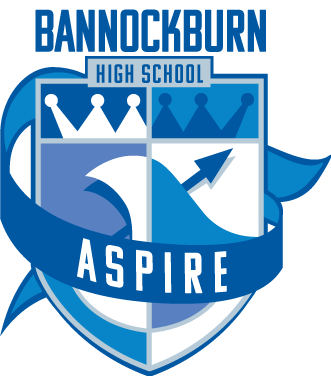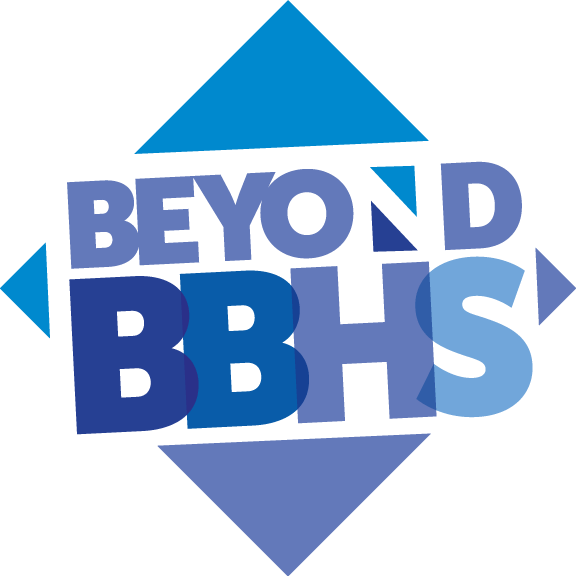Design Technologies
Design Technology
Across the BGE Design Technology projects learners are introduced to and expand on a range of skills from across the Design Technology department. This allows them to develop the skills and personal attributes that will allow them to progress into senior phase subject classes.
The projects are both classroom & workshop based with each containing theory & practical elements. Projects allow learners to cover the knowledge & understanding needed to learn the required skills. This then allHows them put their new and improved skills into action by creating a piece of work be it practical or classroom based work.
The learners create a range of things manually and electronically. The following BGE projects are in place at the moment:
S1 – Acrylic Clock, Aluminium Keytag, Plywood Passive Amplifier, Sketch & Render, Inventor 3D Dice, Rock band merchandise group task.
S2 – Pine Mug Tree, Acrylic headphone Wrap, Aluminium Pen Holder, Toy Shop Rendered Poster, Themed Sketching, Desk Top Published Magazine Article, Children’s Toy Inventor 3D model.
Practical Craft Skills (N3)
Practical Craft Skills is a mainly-practical based subject. It covers a basic & broad introduction to practical skills surrounding woodwork & metalwork with some plastics work.
The course enables pupils to:
- Develop skills in reading and interpreting drawings and diagrams
- Identify, select and use a range of workshop tools, equipment and materials
- Develop basic skills in measuring and marking out of materials
- Develop basic skills in cutting, shaping, fixing and joining materials
- Apply safe working practices in a workshop or similar environment
- Take account of good practice regarding sustainability and recycling
The projects covered allow pupils to improve their practical skills, confidence in safe use of tools & machinery, develop their creativity in the products they create, improve generic literacy & numeracy skills and improve workshop safety. The projects the pupils create focus on specific skills/abilities. Some current projects are: Tea light holder, Bird House, Coat Hook and Frame Mirror & Stand.
This course is suitable for pupils looking to progress further inside and outside of school around subjects/careers that are practical based such as woodwork, joinery & construction.
Graphic Communication
Graphic Communication is split into two main sections in the form of 2D and 3D graphics. In both areas pupils will develop their skills in sketching and in the use of computer software such as Autodesk Inventor. The use of layout, colour and other presentation techniques is covered via desk top publishing software such as Xara. The course is then assessed via a folio of work and final examination.
The course enables pupils to
- Develop skills in graphic communication techniques, including the use of equipment, graphics materials and software
- Develop the ability to extend and apply knowledge and understanding of graphic communication standards, protocols and conventions
- Develop an understanding of the impact of graphic communication technologies on our environment and society
This course is a broad-based qualification, suitable for learners with an interest in both digital and paper-based graphic communication. It is largely learner-centred, includes practical and experiential learning opportunities and is suitable for those wanting to progress onto higher levels of study or a related career.
Design & Manufacture
Design and Manufacture has two key areas in the form of design and the understanding of materials and manufacturing. The course develops skills in
- skills in designing and manufacturing models, prototypes and products
- knowledge and understanding of manufacturing processes and materials
- an understanding of the impact of design and manufacturing technologies on our environment and society
Design – Learners study the design process from brief to design proposal. This helps them develop skills in initiating, developing, articulating, and communicating design proposals. They gain an understanding of the design/make/test process and the importance of evaluating and resolving design proposals on an ongoing basis. Learners also develop an understanding of the factors that influence the design of products.
Manufacture – Candidates study the manufacture of prototypes and products. This helps them develop practical skills in the design/make/test process. They gain an appreciation of the properties and uses of materials, as well as a range of manufacturing processes and techniques, allowing them to evaluate and refine design and manufacturing solutions. Candidates also gain an understanding of commercial manufacture.
This course is suitable for learners attracted by practical activities. It provides a foundation for those considering further study or a career in design, manufacturing, engineering, science, marketing, and related disciplines. The course also offers a complementary practical experience for those studying subjects in the technologies and expressive arts.
Practical Woodworking (N4 & N5)
The Practical Woodworking course provides a broad introduction to practical woodworking. It is largely workshop-based, combining elements of theory and practical woodworking techniques.
Through this, they develop skills, knowledge and understanding of
- woodworking techniques
- measuring and marking out timber sections and sheet materials
- safe working practices in workshop environments
- practical creativity and problem-solving skills
- sustainability issues in a practical woodworking context
The projects covered in the woodwork course focus on three main areas:
- Flat-frame construction
- Carcase construction
- Machining and finishing.
This course is suitable for pupils looking to progress further outside of school around subjects/careers that are practical based such as woodwork, joinery & construction.
Design Engineer Construct (DEC)
Design Engineer Construct!® (DEC) is an accredited learning programme for secondary-school age students and has been expertly developed to create and inspire the next generation of Built Environment professionals. Through a project-based approach, DEC applies pure academic subjects to the latest construction industry practices. The result is young people with real-world practical experience and employability skills.
Thanks to the extraordinary support of industry leaders, professional bodies and progressive universities, DEC delivers an inspiring programme that is up to date and in demand by the very people who will employ our children.
DEC offers a new and innovative project based approach to learning that is both challenging and rewarding. Learners develop knowledge and skills by undertaking a sustainable building project and, through the complementary workshops, have guaranteed face to face engagement with industry professionals.
This subject is suitable for pupils who enjoy teamwork, challenging work and have strengths in the sciences and maths. The course allows the pupils to progress from levels 1 through to 3 by end of the senior phase and they have the availability to achieve the equivalent of Highers with the course being recognised by universities.

